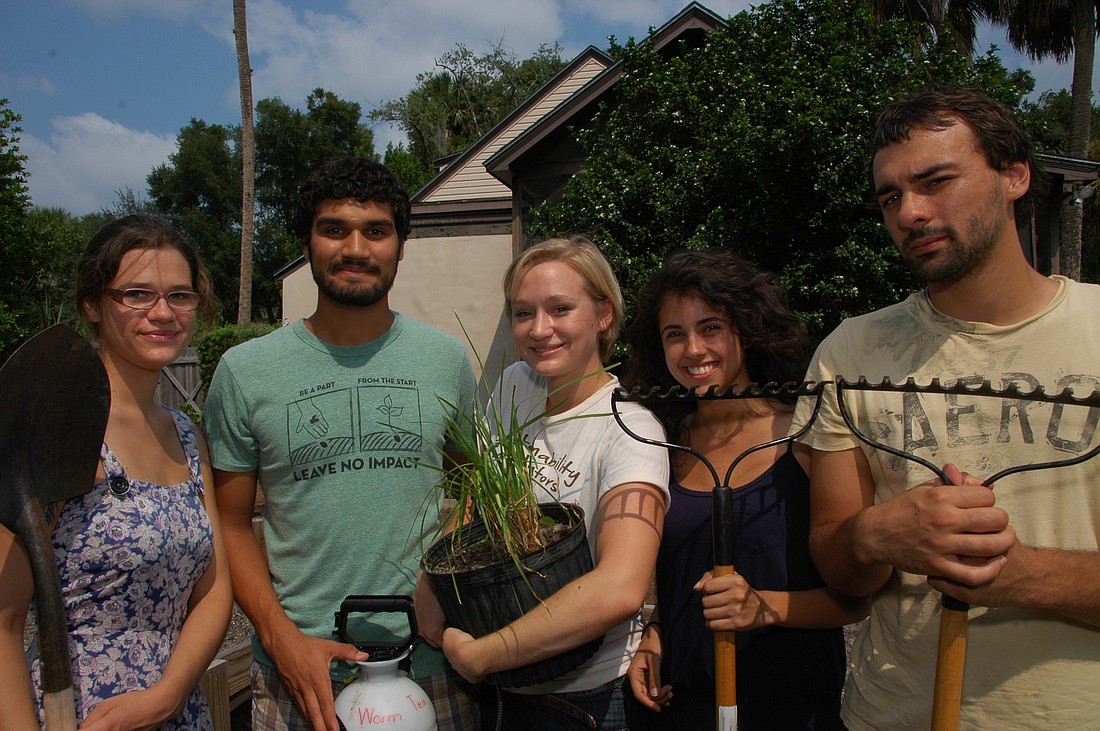- April 18, 2024
-
-
Loading

Loading

The rules are simple and posted on a sign above it. Do put in banana peels, apple cores, paper, bread and laundry lint. Don’t put in meat, sauces, dairy, citrus and plastic.
Inside the worm compost bin, affectionately called the worm condo, red earthworms turn waste into organic soil and fertilizer used for the garden out back.
It's too early to tell if anyone will put the wrong thing in the bin. The seven students responsible for it just moved in, kicking off the second year of eco-living experiment at Rollins College's Mowbray House.
Being the change
Overlooking Lake Virginia in Winter Park, the house is the brainchild of the student-run organizations Eco-Rollins and the Rollins College Sustainability Program.
“It’s doing great things for bringing awareness across campus,” said resident Shan Kasal, 20, a junior biochemistry and marine biology student. “People are always asking questions about it. We want them to. We want them to question what they’re doing and what’s right for the environment.”
Eco-Rollins and the sustainability program acquired the house in the spring of 2010. Since then it’s been inhabited by students that believe living sustainably is the best way.
“For me, it’s really the only way (to live),” said Kristin Urban, house manager of Mowbray. “This house proves to college students and non-college students that you can live sustainably. You can have a rain barrel and grow your own food. You can use paint that doesn’t have chemicals, and you can divert 600 pounds of waste with a worm condo. You can do this type of thing. You can live sustainably, and you can depend on yourself.”
Green living
Every aspect of life in the house is geared toward eco-friendliness. Using compact fluorescent light bulbs, growing an organic vegetable garden out back with recycled homemade wooden plant boxes, taking shorter showers and unplugging appliances when not in use are some of the ways the students try to live sustainably.
This year, the students are continuing those initiatives, such as creating a makeshift organic soap-making station in their kitchen and having a planting day in September to start their garden.
They hope to get funding from the sustainability program for a solar panel to power the living room TV or refrigerator and are looking into a concept called window-farming, which uses a system of tubes to push water up, then have it drip down to water indoor plants, reusing the same water over and over again.
For Megan Frederick, a 21-year-old senior biochemistry and molecular biology major and second-year resident at Mowbray, the 2,800-square-foot home is proof that college students care about environmental issues and want to be the change they envision.
“Just being in this sort of community makes you more aware of your environmental impact,” she said. “I’ve become so aware of my consumption and what we can do as individuals to improve the environment. Our individual efforts are how we make up the whole.”
Making a difference
In order to live in the five-bedroom, three-and-a-half-bath house, students must commit to keep up and maintain the eco-friendly practices of the house, serve as ambassadors for green living in the community and be an officer or active member of either Eco-Rollins or the sustainability program. Eighteen students applied this year.
Rollins took control of Mowbray in 1958 after a former student, the Rev. Henry B. Mowbray, bequeathed his home to the school when he died.
Since then, the house has been lived in by the assistant dean of the college, the dean of student affairs, the director of residential life and a sorority. It even served as a dorm for international students.
For Ann Francis, club adviser to Eco-Rollins and manager of the sustainability program, the message is simple:
“Everybody can make a difference … The house is embodying the reuse, rethink, reduce idea we can all live by.”